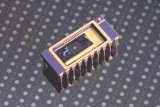Built for Beam Steering and Pico-Projector-Displays – LinScan Micro-Scanning-Mirrors are available now!
In the past fife years, Fraunhofer Institute for Photonic Microsystems IPMS in Dresden developed a new type of micro scanning mirror called LinScan. The new technology is especially suitable for beam steering and pico-laser-projection display applications.
Various applications like barcode readers, scanning grating spectrometers or light detection and ranging (LIDAR) require dynamic deflection of light. Micro scanning mirrors are the cutting edge technology when it comes to providing robust and cost efficient scanning capabilities for ultra mobile and low power consumption applications. The novel device concept LinScan allows for static actuation of certain deflection positions in a continuous scan range as well as linear scanning about one of optionally two scan axes. Hence it can be utilized for applications that could not be addressed with Fraunhofer IPMS’s existing resonant micro scanning technology. With LinScan even large mechanical scan angles of about ±11,5° can be addressed statically and point by point. »This is very important for beam steering applications like laser marking and writing«, says Denis Jung, who developed the LinScan device concept within his doctoral thesis. Furthermore the so called quasistatic scan regime allows to dynamically modify the scan trajectory. For example with LinScan a saw tooth shaped scan trajectory can be realized which enables line-wise writing of images in pico-laser-projection displays. The line-wise scan pattern enhances picture resolution and contrast compared to existing resonant scanning mirrors. »First demonstrator samples, which are now available for evaluation by customers show the capability of SVGA resolution«, explains Denis Jung and points out »LinScan devices use the electrostatic driving principle and hence consume significantly less power than competitive electromagnetic micro scanning mirrors with a comparable performance level«.
The scientific community shows great interest in LinScan and its potential to be a key component as a game changer in ultra portable and light weight display solutions. The paper of Denis Jung on the first LinScan demonstrators recently presented at the Photonics West 2012 conference and trade show in San Francisco, USA. earned the best student paper award for relevance in science and industry and scientific excellence.
About Fraunhofer IPMS
The Fraunhofer Institute for Photonic Microsystems IPMS and its 220 employees turn over an annual research volume of nearly 26 million euros. Fraunhofer IPMS generates more than two thirds of this production capacity out of commissions from industry and publicly financed projects in applied research. The focus of our development and production services lies in the practical industrial application of unique technological know-how in the fields of (optical) micro-electromechanical systems [MEMS, MOEMS] . Fraunhofer IMPS uses scientific know-how, application experience and customer contacts as well as modern equipment and clean room infrastructure. Fraunhofer IPMS covers a broad spectrum of industrial applications. Our services range from initial conception to product development, right down to serial pilot production – from a single component to a complete system solution.
 Fraunhofer Institute for Photonic Microsystems
Fraunhofer Institute for Photonic Microsystems